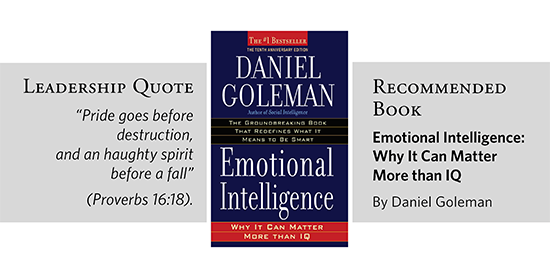
August-
September 2019
Homemade Faith
------------------
|





The column "Leadership Whiteboard" provides a short visual leadership coaching moment. It introduces and explains a new sketch in each issue, provides leadership coaching for further development, and shares a leadership quote and recommended book.
Self Awareness in Leadership
How many times have you snapped a photo of your wife or daughter only to be asked to retake it at least five more times? Their self-awareness of every detail can teach leaders to be more self-aware through better reflection. This leadership category, by its very namesake, poses one of the most significant blind spots for leaders today.
By nature, leaders bring passion and self-confidence often referred to as conviction. First, do not confuse personal conviction with biblical principles; they are not always the same. Leaders must bring a determination and doggedness because inspiration and persuasion cannot be done from timidity. However, that confidence does not automatically remove weakness or provide competence for gap areas.

What then is self-awareness, and how does self-awareness impact one’s conviction regarding leadership? Self-awareness comes from the Greek: know thyself. The Harvard Business Review said, “The trinity of self-awareness is know thyself, improve thyself, and complement thyself” (allowing others’ strengths to balance your weaknesses). It stops you from living in your own world and thinking you’re always right. Self-awareness requires self-reflection or self-examination of both reason and emotions.
As ministry leaders, you must guard against blind spots and not squelch critical feedback regarding your ideas. The idea of zero self-awareness is older than the fable Emperor’s New Clothes in which only a child was willing to tell him the truth; the emperor had nothing to hide behind.
Self-awareness improves decision-making because it removes factors that could otherwise predetermine an adverse outcome. The Bible is not silent on this subject as the various leaders writing in the Psalms reflect on searching their emotions, thoughts, attitudes, decisions, and actions (Psalm 19:14; Psalm 139; Psalm 73:26). James warned about inauthentic assessment of self as one who looks in a mirror and forgets what is seen. Paul reminds believers to examine themselves when partaking of communion, again in 2 Corinthians 13:5.
No human finds right standing before God without admitting vulnerability and need of Christ. Likewise, no leader finds right standing before the organization or team without acknowledging self-awareness and the need for the giftedness of the whole Body
of Christ (1 Corinthians 12).
About the Columnist: Ron Hunter Jr., Ph.D., is CEO of Randall House
Publications.

|
|

